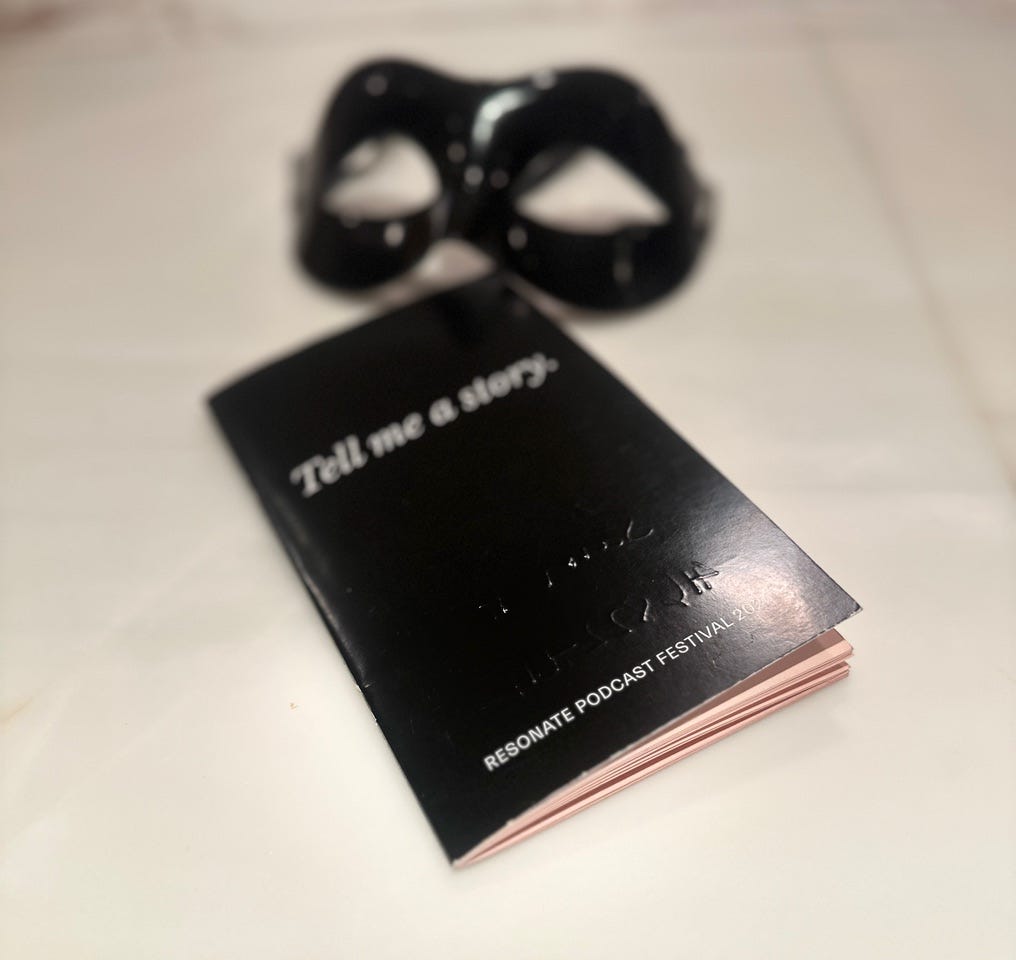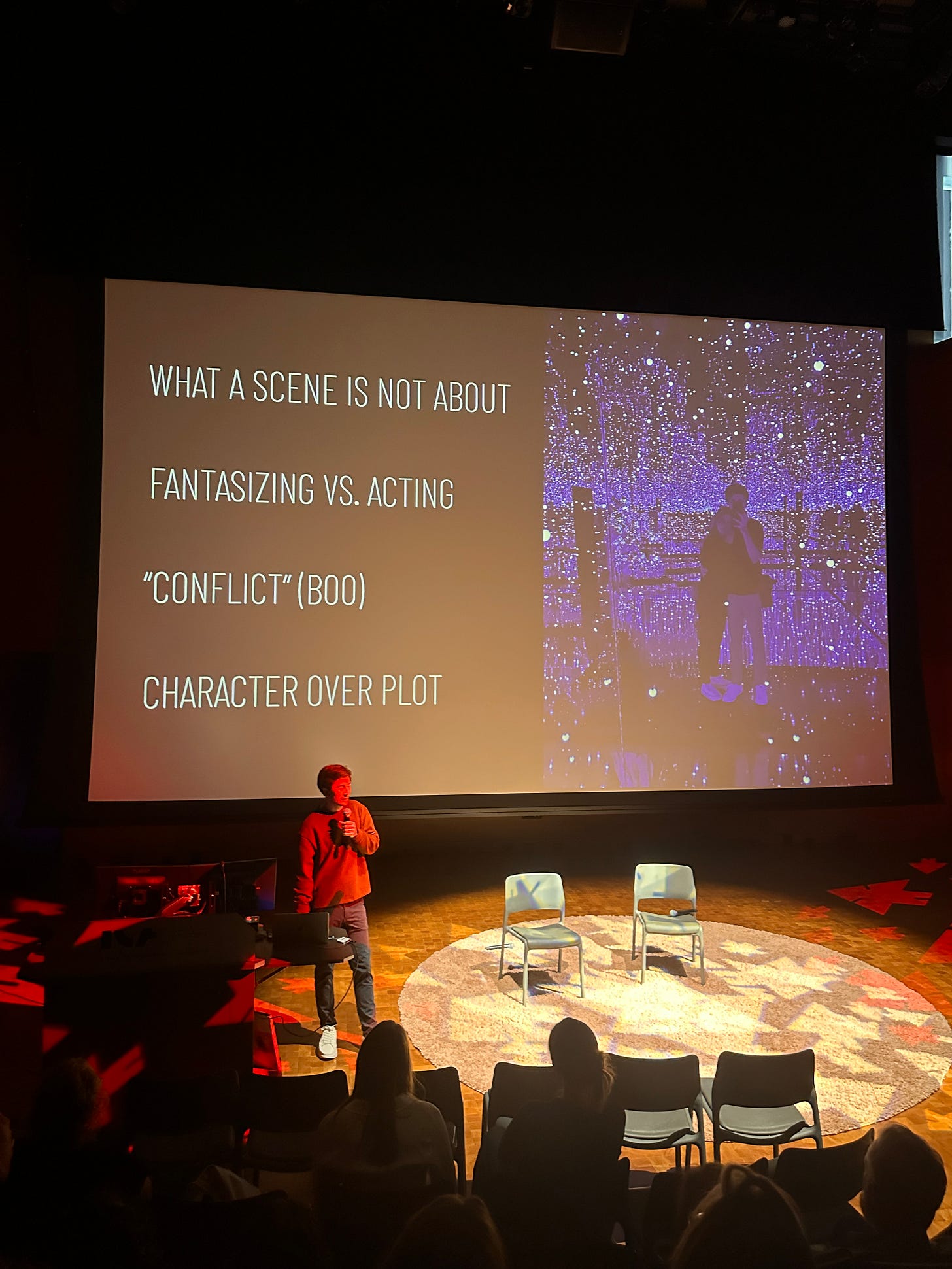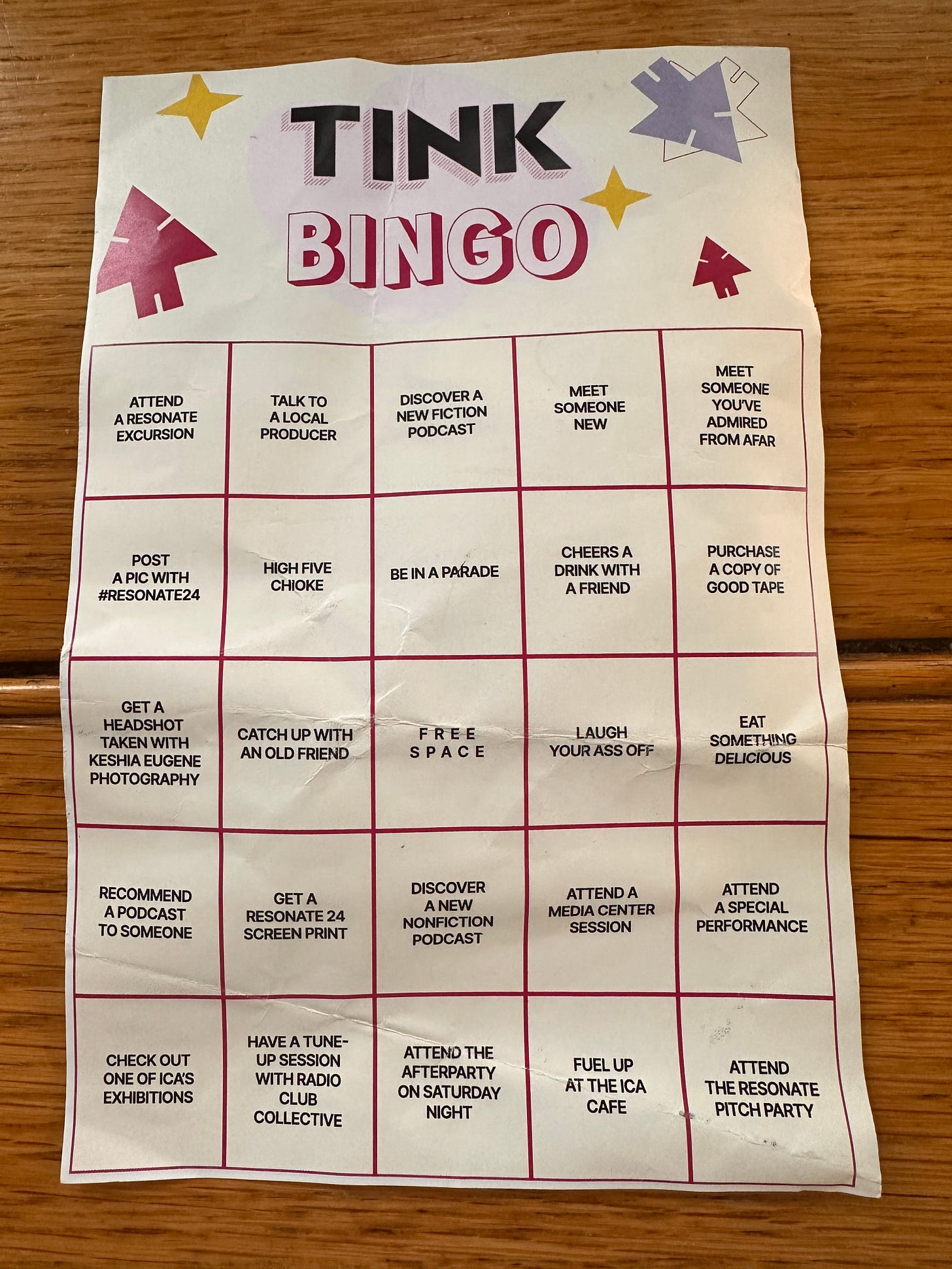Resonate Podcast Festival 2024 was a hotly anticipated industry event. After its sophomore edition last year, which embodied an emotional high, it took less than six hours for the (very affordable) tickets to sell out.
Despite resounding industry interest for the event to grow, roughly the same number of attendees flocked to the campus of Virginia Commonwealth University (VCU), situated at the gorgeous Institute of Contemporary Art (ICA), in Richmond, Virginia this past weekend.
Dr. Chioke I’Anson founded the festival in 2022, with Kelly Jones as co-host and co-facilitator of the event. At just two days, it’s brief but deceptively deep. Both days are jam-packed with presentations, smaller workshops, satellite events, listening events, tasteful sponsor messages, and a closing keynote from the venerated Ray Christian.
Following Bradley Campbell’s story structure napkins featured in Gabby Bulgarelli’s presentation Story Shape Up, this post will follow the “e” structure: it will start at the end and loop back to the beginning.
Chioke I’Anson reminded us when he took the stage: “So we will see you back here, at 8:30pm tonight, right?”
All day he would repeat: “Where is it you have to be tonight at 8:30? Correct.” And: “Did I remind you about being back here for 8:30? Don’t be late.”
Dutifully, most of us responded. Because if this were a cult, which is debatable, and our fearless leader is Chioke, which, just saying, could work, we abided, so that at 8:25 sharp, I was standing outside the ICA with hundreds of other festival attendees.
We all curiously peered inside the vaulted two-story glass room, with its Frank Ghery-inspired staircase that winds up to the mezzanine level. The tables that just hours before had housed various sponsors, gave away stickers, answered questions, held court with AIR and The Podcast Academy, featured Focusrite gear, gave away free t-shirts and pens and notebooks and free snacks…were all gone.
Now there were lights, speakers, and placards with numbers equally spaced throughout the room and curled up the stairs. It was a lot of empty space, which felt like a blank slate. Room to think, and space for new ideas.
When the doors finally opened, we were invited in, passed a sealed black envelope with a number written on it, and received an Eyes Wide Shut mask were were told to wear.
The closing moment for a festival like this one, which fuses art and economy, intellect and passion, fiction and non-fiction was something of an elusive note to hit. By this point our attention spans had been fully taxed. Our artistic veins were pulsed and our engagement was satiated.
What we needed, maybe even craved, was a moment that could cauterize this entire experience. Our new connections and friendships needed a moment longer to cement, our engaged spirits begged for an outlet to burst open.
The event began without explanation
There was no traffic management or follow-up notes for what was about to happen. Out of this primordial ooze, Jemma Rose Brown began her performance, which was poetic and vague. It was an exact cross between fiction and non-fiction, the theme of the fest. It began with /beat poetry performance—which explained a moment—when we felt the whirlpool of life around us.
Each time she said the word “whirlpool,” the people who held rain sticks were instructed to flip them upside down. The tinkling, cascading sound effect wafted up the 50-foot high ceilings.
Jemma walked in circles, that got smaller and smaller, until it was as though she went down the drain, which was either ironic or an oppositional metaphor, given the title: “Ascending the Whirlpool.”
Her lying on the floor was our cue to open our envelopes, which contained our assignment: there were lyrics to a song, and that we should start singing—anything goes. As we sang, we descended the stairs, marched out of the building, and formed a parade as we marched to the closing party at the Common House venue, about a half mile away.
A parade is both the easiest and the most difficult thing to organize. As any proper parade should have, police were there to stop the traffic so we could cross the roads safely. Horn honks of either annoyance or solidarity filled an unusually grid-locked intersection of downtown Richmond.
We marched in masks, throwing dried leaves around, shaking rain sticks, and ringing small bells. We lit sparklers and sang and shouted the song.
“I quit my job…bought a one way ticket! Throw it all out the window!”
By the time we reached the 5-floor walk-up of the Common House, the sound was a full-blown chant of protest. It was a catharsis. And when we reached the rooftop party at The Common House, Kaitlin Prest was found floating in a mermaid outfit in the rooftop pool. As if to prove the point.

According to the “e” structure, it’s now time to go back to the beginning
Richmond, Virginia is a historic, beautiful college town. Its wide herringbone-bricked sidewalks remind me of New York, but then the streets reminded me of a Maritime city like Halifax, with its mixture of brick and brightly painted wooden homes, all with long rows of conjoined front porches to sit and chinwag with your neighbours.
Unlike other festivals that might feature panel discussions and onstage group chats, each Resonate presentation was skillfully delivered; each of them was Ted Talk-level good (making the new white circular carpet on stage quite on the nose).
When you arrive at Resonate, you receive a small notebook
It’s designed to be a note-taking device, and based on my own straw poll watching people scribble, it was extremely successful. I filled my book.
On the surface, the predominant theme was fiction: what can it teach us about how to be more creative? What techniques of making fiction can teach those working primarily in non-fiction to be more ‘real’? How can this teach us to innovate and make bold new things?
This theme felt very prescient. It felt like an antinode to my own feeling of aural malaise I’ve felt in the past few months. Add to this the ongoing feeling of brokenness in the industry right now, it’s time to shake it up and try new things. Or….it’s time to go back to the way things used to be. A long time ago. Before all the big money changed this corner of the creative world.
In his own way, maybe Chioke is helping us get back to our factory default settings with this event. If I’m reading it correctly, his smoke signal roughly translates to this: it’s a time for innovation and new collaborations.
Some details…
Nichole Hill opened the event with Fabulously Real talk, which she borrowed from improvisational acting to find a catalyst with her characters for her Tribeca Selects audio fiction project Our Ancestors Were Messy.
James Kim reminded us to abandon perfection, while also giving us some great new ideas about how to record audio, and how to leave space for some space for sound to happen inside audio. Avery Trufelman interviewed Chioke I’Anson about his fashion on stage!
Shaun Michael Colón debuted another chapter of his documentary, Age of Audio, and then of course there was the Pitch Party (which is best summarized by Elaine Appleton Grant in Sound Judgment).
Davy Gardner, audio fiction writer and curator of Tribeca Audio, gave a bang-up presentation about his writing process. As he was getting his presentation cued up, his microphone died. Without missing a beat, Ivy Le yelled out to the crowd “Does anyone know how to work sound here?”
These inside jokes fueled the crowd, and with improvisational spirit, his talk equally became a group therapy session. Davy requested two volunteers to play an improv game on the stage and then asked the audience to shout out cues for what they saw happening on stage. Boss! Getting Fired! HR Department Head! Wrote a social media post and he’s getting reprimanded for it!
On cue, Davy turned to the audience and flawlessly delivered his punch line as stage direction: INTERIOR, NPR OFFICE.
Mia Lobel was there with an industry pep talk, keeping it real by admitting that it’s also been a rough year for her. She sent us off with a 4-part reminder which included a call to action for all of us to find our flock…a good reminder of why many of us were there at Resonate. Find her full presentation HERE.
There were multiple listening events sprinkled throughout the event. So many that I’ve come away really feeling like I heard a lot of audio, after I went to a podcast festival…which might seem obvious, but is not always the case in my experience. Satellite events were held by In The Dark and ECCO; in-house events were from Denis Funke and Written in Air, and of course, the spirit animal of the event, Audio Flux.
Yes, You Can Buy This
Resonate is not an explicitly commercial event, but it’s not completely absent either. This year the money talk felt more grounded, less frantic. Maybe it was more real. In the lobby copies of Good Tape were for sale (2 copies for $15). Last year they were given away free, despite the fact it was a colour broadsheet print run, which is pricey. You could also pre-order a vinyl-pressed copy of Audio Flux Circuit 4, allowing for a High Fidelity moment for audiophiles. You could visit the table and subscribe to Selects, the criterion channel for narrative audio (and take home a free Selects t-shirt too).
In the closing moments, the pitches came. The journal Soundfields is getting ready to publish again. They took to the stage to solicit pre-orders with a giant QR code for the next edition, which will printed in hard copy. A series was also for sale; following their Gaylor presentation, Jazmine Green and Sarah Esocoff announced that Season 2 of sounds gay is seeking a distribution partner.
The timing of all this, at the closing moment of the festival, was honest, if a bit awkward. There’s never a perfect time to talk about money, but it has to be done. I’ve been to plenty of other festivals when the Thank-The-Sponsors moment happens, and you either dip into your phone, or nod off in your seat.
But Resonate achieved a new tone with this required moment of the festival. The lead sponsor VPM had the Director of Podcast Production Meg Lindholm gave a brief address…she was also fully embedded in the festival and wasn’t just a walk-on for this moment.
And then all of these overtly financial discussions were cleansed and reset by the closing keynote from Ray Christian, a venerable storyteller, who reminded us that sometimes our life stories are all the fodder we need for connection.
MORE LINKS AND RECOMMENDATIONS:
Arielle Nissenblat made a playlist of ALL the podcasts mentioned on stage at Resonate. WOW! Find it HERE
Wil Williams daily live dispatches…details details details, including an indexed Google Doc for you…Find it all HERE
And in case you feel like printing this to play at home, here’s your Tink Bingo Card:






Each post about Resonate gives me FOMO. Next year
Sounds like audio magic! Seems to capture some of the early atmos of Third Coast (I got there in 2011, loved it), pre-Serial, when nobody was a podcast celebrity and audio was a minority passion. Great to know the passion survives... Maybe next year!